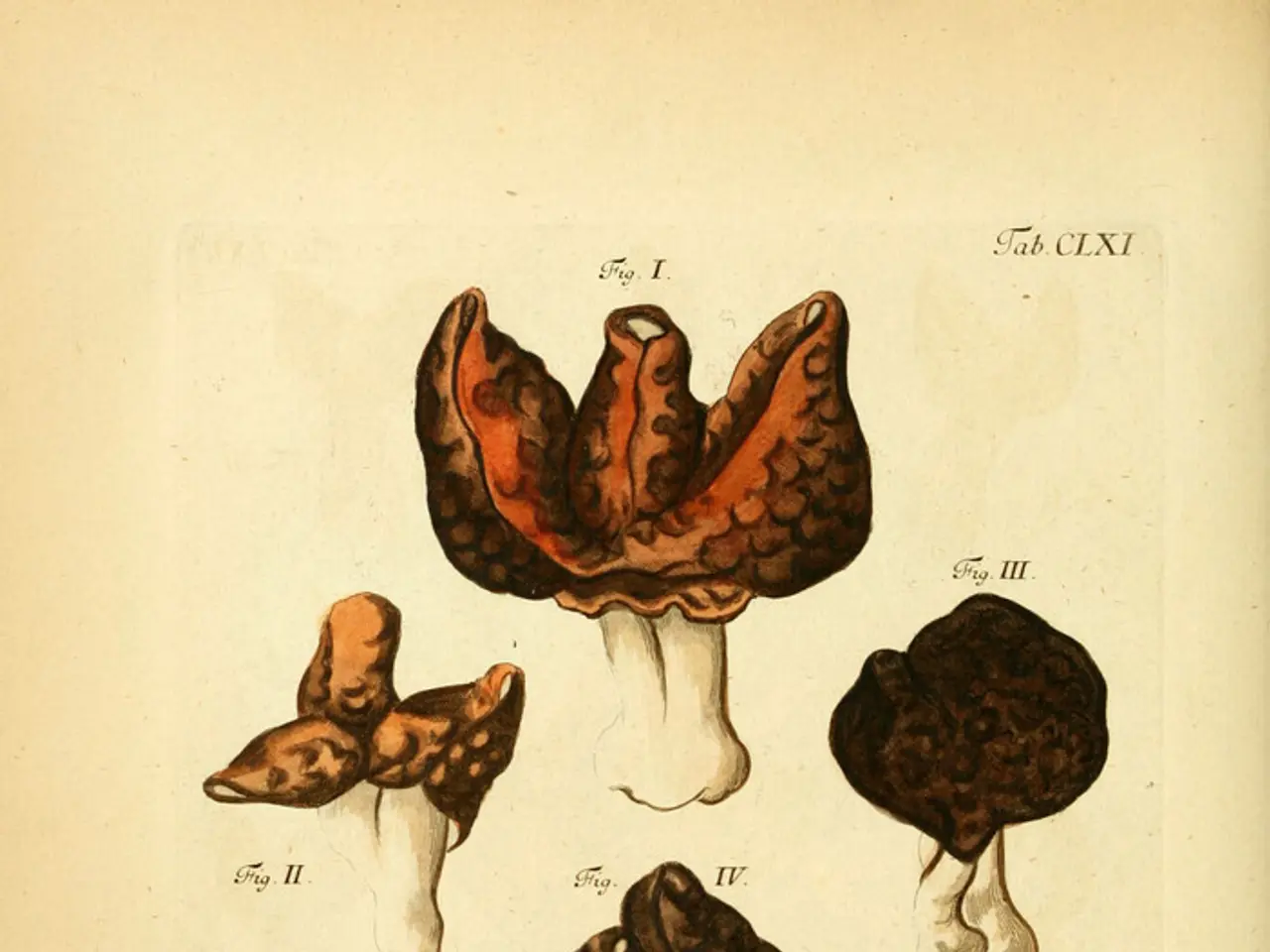Multiple individuals in Tomsk region have been reportedly affected by mushroom poisoning so far this year
In the picturesque forests of Tomsk, the arrival of autumn brings a bounty of edible mushrooms. However, it's essential to approach mushroom foraging with caution to avoid potential risks.
Before setting foot in the woods, Rospotrebnadzor, the Russian consumer protection watchdog, advises refusing old, wormy, and damaged mushroom specimens. Moreover, improper culinary processing and consuming poisonous or conditionally edible mushrooms can lead to poisoning, as three cases have been registered in the Tomsk region since the start of 2025.
To identify edible mushrooms, common species in Siberian forests, including Tomsk, typically include boletus (bolete), chanterelles, and russulas. When foraging, learn the distinguishing features of edible species such as cap shape, colour, gill structure, and spore prints. It's crucial to avoid mushrooms with white gills, a ring on the stem, and a bulbous base, as these can be characteristics of some deadly Amanita species.
To ensure safety, pick mushrooms only from unpolluted areas, away from roads, industrial sites, and contaminated lands. In Tomsk region, avoid mushrooms near industrial plants or areas with potential heavy metal contamination. Wash mushrooms thoroughly and cook them well to reduce potential toxins and parasites.
It's also recommended to use local mushroom identification guides specific to Tomsk or Western Siberia, join local mycological clubs, or seek out mushroom experts familiar with the Tomsk ecosystem. If you require detailed local mushroom species identification beyond general advice, consulting regional mycologists or official environmental health services in Tomsk is essential to reduce the risk of poisoning.
Rospotrebnadzor urges Tomsk residents to be particularly careful during the mushroom season. They also advise picking only well-known species of mushrooms and not consuming mushrooms bought at open markets. Each mushroom should be cut with the whole stem for accurate identification and prepared on the day of picking.
In the event of symptoms of poisoning after eating mushrooms, seek medical help immediately. Before the main preparation, mushrooms should be boiled for 10 minutes, drained, rinsed, and only then fried or stewed.
Mushrooms are heavy on digestion, especially for children, and those under school age should not be given mushrooms at all. Canned mushrooms can be a source of deadly botulism, so it's best to avoid them.
By following these guidelines, Tomsk residents can safely enjoy the bounty of the autumn forests and avoid potential risks associated with mushroom foraging.
- Science has shown that proper identification and preparation of mushrooms are crucial for avoiding potential risks in the workplace-wellness sector.
- Medical conditions related to chronic diseases, such as digestive health issues, can be exacerbated by consuming poisonous or improperly cooked mushrooms.
- Respiratory conditions like asthma may be triggered by certain skin-conditions on mushrooms, emphasizing the importance of thorough cleaning before consumption.
- Eye-health may also be affected by consuming toxic mushrooms, leading to potential vision problems.
- Hearing impairment has not been directly linked to mushroom consumption, but maintaining good health-and-wellness through proper nutrition is always beneficial.
- Fitness-and-exercise and mental-health are closely connected, and enjoying the outdoor activity of mushroom foraging can contribute positively to both aspects.
- Men's health can be impacted by various medical conditions, including autoimmune disorders and neurological disorders, for which climate-change might be a contributing factor.
- Therapies-and-treatments for these conditions often involve extensive personal-finance management, making financial literacy essential for overall well-being.
- Womens-health is equally important, with issues such as skin-care, sexual-health, and aging requiring regular attention and care.
- Parenting involves not only physical care but also the responsibility of weight-management, ensuring a balanced diet for children that includes or excludes mushrooms depending on their age.
- Cardiovascular-health is another essential aspect of health-and-wellness, with mushrooms rich in certain nutrients potentially contributing to a balanced diet.
- Medicare plays a significant role in providing healthcare access for many, but affordability and coverage of various treatments, including mushroom therapies, can vary.
- CBD, a popular health supplement, has been researched in environmental-science to determine its effects on various health factors, including mental-health and neurological-disorders.
- The financial implications of climate-change are vast, affecting everything from healthcare costs to food production, including mushrooms.
- With the rise of global warming and potential changes in mushroom growing patterns, it's essential for mycologists and environmental health services to monitor and adapt their guidance accordingly.
- Mental-health, particularly stress and anxiety levels, can fluctuate during uncertain times like the ongoing mushroom season. Prioritizing self-care, seeking professional help if needed, and enjoying safe activities like mushroom foraging can help maintain a balanced mental state.




